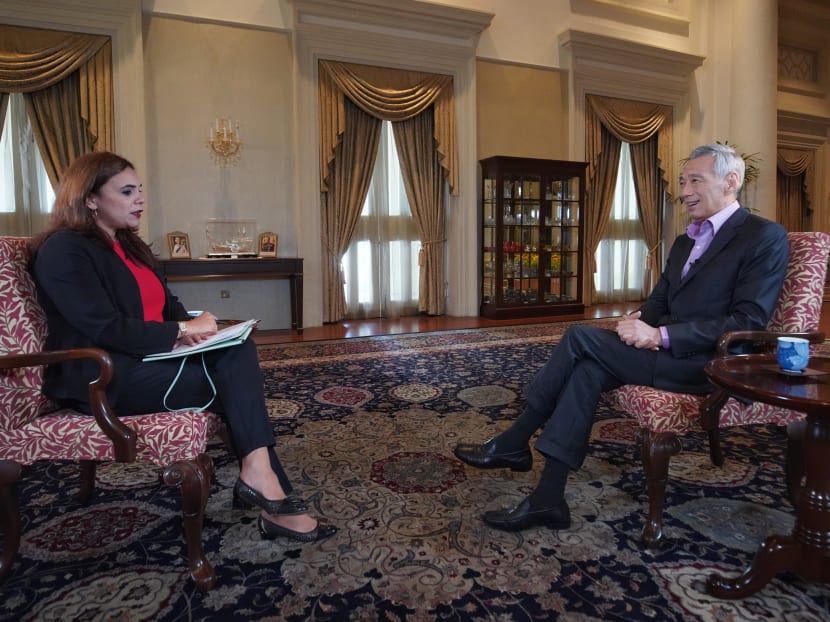S’pore not under pressure to accelerate vaccine programme due to low community cases: PM Lee
SINGAPORE — Singapore has not been under “quite as much pressure” to get the population vaccinated quickly, as there have been fewer domestic cases here, said Prime Minister Lee Hsien Loong.

Prime Minister Lee Hsien Loong (right) during an interview with the BBC’s Talking Business Asia programme on March 2, 2021.
- There has been time to explain Covid-19 vaccination to people here and persuade them to get inoculated, said PM Lee in a BBC interview
- China’s Sinovac vaccine will be used if proven to be safe and effective, and not based on nationality, he added
- PM Lee said that he hopes that international borders can open by the end of the year or next year, if not sooner.
SINGAPORE — Singapore has not been under “quite as much pressure” to get the population vaccinated quickly, as there have been fewer domestic cases here, said Prime Minister Lee Hsien Loong.
Mr Lee said this during an interview with the BBC’s Talking Business Asia programme on Tuesday (March 2), in response to a question on why Singapore has not moved as quickly as countries such as Britain and Israel with its vaccination strategy.
“We have not been under quite as much pressure because we did not have so many cases domestically,” said PM Lee “There was time for us to explain to people, persuade them, reassure them, and dispel their worries and anxieties, and to do it in a systematic way”.
As of March 7, more than 596,000 Covid-19 vaccine doses have been administered in Singapore. In total, about 379,000 people have received one dose, and more than 217,000 have completed the two-dose vaccination programme.
Currently, vaccines from only Pfizer-BioNTech and Moderna have been approved for use here. Both require two doses.
Frontline workers such as those working at Singapore’s borders, hospital workers and those in the construction industry have been given priority to receive the jabs.
“In our case, our society’s infection rates are very low, but we are at risk from our borders, from the frontline,” said PM Lee. “For us, that was our first priority — to take care of them.”
He added that Singapore is also “going broadly by age” in its vaccination approach.
Over 55,000 seniors aged 70 and up have received their first dose of the vaccine, and all seniors aged 60 to 69 will be offered the Covid-19 vaccine before the end of March.
According to the BBC, about 22.5 million people in Britain have had a first vaccine dose and more than one million have had a second as of Wednesday.
People there have also been allowed to take the second dose up to 12 weeks later, a bigger gap than the recommended 21 to 28 days. This was done to allow more people to get their first dose.
Meanwhile, Israel has also employed strategies such as partnering with restaurants, using food to entice residents there to get vaccinated, Reuters reported on Tuesday.
The nation is leading the world in the speed of its vaccination drive, with 43 per cent of the population vaccinated with at least one shot of the Pfizer vaccine.
VACCINES ‘DO NOT CARRY NATIONALITY’
Last month, Singapore received the first shipment of a third vaccine — made by China’s Sinovac — but has yet to authorise it for use.
Asked whether Singapore was under pressure to use a Chinese-made vaccine, PM Lee said that should Sinovac’s vaccine prove to be safe and effective, then it would be used.
“We use vaccines from any source, vaccines do not carry nationality,” he said.
He added that China has very capable scientists, biomedical researchers and vaccine researchers, and that he has “no doubt that they are capable of making good vaccines”.
“I do not think there is any basis for people to say, a vaccine comes from China, it is no good, or conversely, a vaccine comes from China, it must be good because I am a Chinaman and it matches my DNA.”
HOPES TO OPEN UP BORDERS ‘BY YEAR-END’
Asked if he sees life returning to normal, PM Lee said that while the pandemic might last three to five years, he hopes to open up international borders by the end of this year or next year, if not earlier.
This can be achieved if many countries have substantial portions of their populations vaccinated by later this year, and there are systems in place to open up the borders safely, he said.
“It would not be like before where you can just buy a ticket, hop onto the plane and go off to Hong Kong, Bangkok or Bali for a weekend of casual holiday.”
There will need to be documentation to prove that you have been properly vaccinated, or perhaps be tested to prove the presence of antibodies when one flies, he added.
He added that he hoped Singapore would be able to create safe corridors or travel bubbles between countries where outbreaks are well under control, such as the one with Hong Kong last year which was scrapped before the first flight.
“The virus moves very quickly,” he said. “Everytime you think you are about safe to start, something happens… so we have not really started.”











